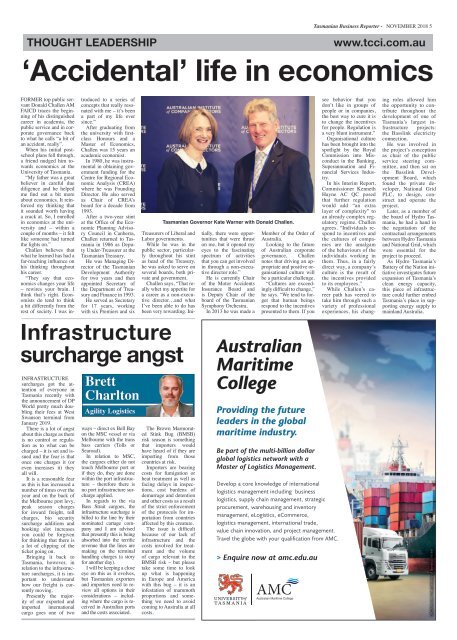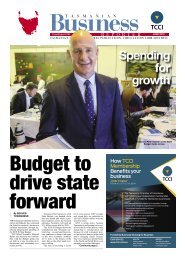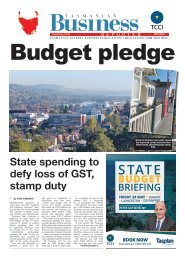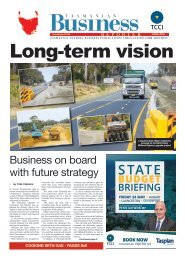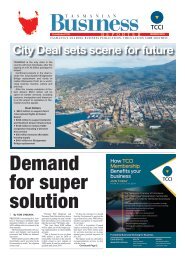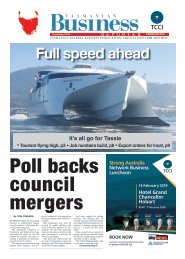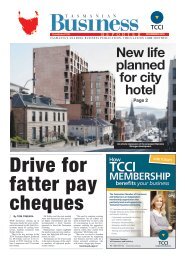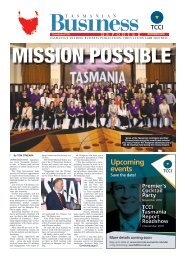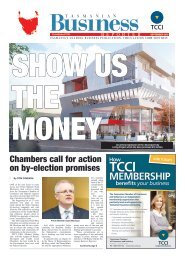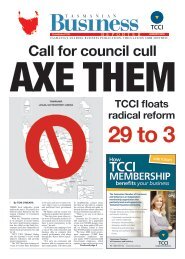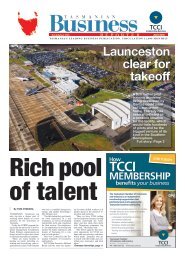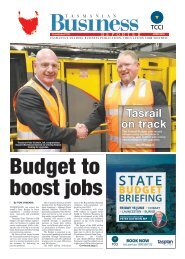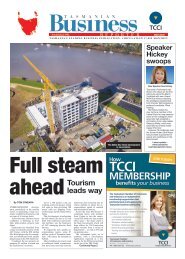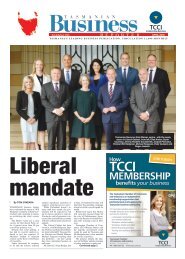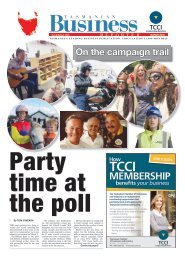Tasmanian Business Reporter November 2018
Welcome to the November edition of the Tasmanian Business Reporter. In this month's edition you'll read about the new vision for Macquarie Point, which TCCI CEO Michael Bailey believes is a once-in-a-generation opportunity for Tasmania if planned correctly and underpinned by residential development. You will also find details about a new Hobart fashion festival and strong profits from Tasmania’s two financial institutions, as well as some poignant HR tips for employers about how to handle the upcoming 'silly season' from TCCI Workplace Relations Consultant Abbey George.
Welcome to the November edition of the Tasmanian Business Reporter.
In this month's edition you'll read about the new vision for Macquarie Point, which TCCI CEO Michael Bailey believes is a once-in-a-generation opportunity for Tasmania if planned correctly and underpinned by residential development.
You will also find details about a new Hobart fashion festival and strong profits from Tasmania’s two financial institutions, as well as some poignant HR tips for employers about how to handle the upcoming 'silly season' from TCCI Workplace Relations Consultant Abbey George.
You also want an ePaper? Increase the reach of your titles
YUMPU automatically turns print PDFs into web optimized ePapers that Google loves.
<strong>Tasmanian</strong> <strong>Business</strong> <strong>Reporter</strong> - NOVEMBER <strong>2018</strong> 5<br />
THOUGHT LEADERSHIP<br />
www.tcci.com.au<br />
‘Accidental’ life in economics<br />
FORMER top public servant<br />
Donald Challen AM<br />
FAICD traces the beginning<br />
of his distinguished<br />
career in academia, the<br />
public service and in corporate<br />
governance back<br />
to what he calls “a bit of<br />
an accident, really”.<br />
When his initial postschool<br />
plans fell through,<br />
a friend nudged him towards<br />
economics at the<br />
University of Tasmania.<br />
“My father was a great<br />
believer in careful due<br />
diligence and he helped<br />
me find out a bit more<br />
about economics. It reinforced<br />
my thinking that<br />
it sounded worth having<br />
a crack at. So, I enrolled<br />
in economics at the university<br />
and – within a<br />
couple of months – it felt<br />
like someone had turned<br />
the lights on.”<br />
Challen believes that<br />
what he learned has had a<br />
far-reaching influence on<br />
his thinking throughout<br />
his career.<br />
“They say that economics<br />
changes your life<br />
– rewires your brain. I<br />
think that’s right. Economists<br />
do tend to think<br />
a bit differently from the<br />
rest of society. I was introduced<br />
to a series of<br />
concepts that really resonated<br />
with me – it’s been<br />
a part of my life ever<br />
since.”<br />
After graduating from<br />
the university with firstclass<br />
Honours and a<br />
Master of Economics,<br />
Challen was 15 years an<br />
academic economist.<br />
In 1980, he was instrumental<br />
in obtaining government<br />
funding for the<br />
Centre for Regional Economic<br />
Analysis (CREA)<br />
where he was Founding<br />
Director. He also served<br />
as Chair of CREA’s<br />
board for a decade from<br />
1993.<br />
After a two-year stint<br />
at the Office of the Economic<br />
Planning Advisory<br />
Council in Canberra,<br />
Challen returned to Tasmania<br />
in 1986 as Deputy<br />
Under-Treasurer at the<br />
<strong>Tasmanian</strong> Treasury.<br />
He was Managing Director<br />
of the <strong>Tasmanian</strong><br />
Development Authority<br />
for two years and then<br />
appointed Secretary of<br />
the Department of Treasury<br />
and Finance in 1993.<br />
He served as Secretary<br />
for 17 years, working<br />
with six Premiers and six<br />
<strong>Tasmanian</strong> Governor Kate Warner with Donald Challen.<br />
Treasurers of Liberal and<br />
Labor governments.<br />
While he was in the<br />
public sector, particularly<br />
throughout his stint<br />
as head of the Treasury,<br />
he was asked to serve on<br />
several boards, both private<br />
and government.<br />
Challen says, “That really<br />
whet my appetite for<br />
a career as a non-executive<br />
director…and what<br />
I’ve been able to do has<br />
been very rewarding. Initially,<br />
there were opportunities<br />
that were thrust<br />
on me, but it opened my<br />
eyes to the fascinating<br />
spectrum of activities<br />
that you can get involved<br />
in through a non-executive<br />
director role.”<br />
He is currently Chair<br />
of the Motor Accidents<br />
Insurance Board and<br />
is Deputy Chair of the<br />
board of the <strong>Tasmanian</strong><br />
Symphony Orchestra.<br />
In 2013 he was made a<br />
Member of the Order of<br />
Australia.<br />
Looking to the future<br />
of Australian corporate<br />
governance, Challen<br />
notes that driving an appropriate<br />
and positive organisational<br />
culture will<br />
be a particular challenge.<br />
“Cultures are exceedingly<br />
difficult to change,”<br />
he says. “We tend to forget<br />
that human beings<br />
respond to the incentives<br />
presented to them. If you<br />
see behavior that you<br />
don’t like in groups of<br />
people or in companies,<br />
the best way to cure it is<br />
to change the incentives<br />
for people. Regulation is<br />
a very blunt instrument.”<br />
Organisational culture<br />
has been brought into the<br />
spotlight by the Royal<br />
Commission into Misconduct<br />
in the Banking,<br />
Superannuation and Financial<br />
Services Industry.<br />
In his Interim Report,<br />
Commissioner Kenneth<br />
Hayne AC QC posed<br />
that further regulation<br />
would add “an extra<br />
layer of complexity” to<br />
an already complex regulatory<br />
regime. Challen<br />
agrees. “Individuals respond<br />
to incentives and<br />
the cultures of companies<br />
are the amalgam<br />
of the behaviours of the<br />
individuals working in<br />
them. Thus, in a fairly<br />
direct way, a company’s<br />
culture is the result of<br />
the incentives provided<br />
to its employees.”<br />
While Challen’s career<br />
path has veered to<br />
take him through such a<br />
variety of professional<br />
experiences, his changing<br />
roles allowed him<br />
the opportunity to contribute<br />
throughout the<br />
development of one of<br />
Tasmania’s largest infrastructure<br />
projects:<br />
the Basslink electricity<br />
connection.<br />
He was involved in<br />
the project’s conception<br />
as chair of the public<br />
service steering committee,<br />
and then sat on<br />
the Basslink Development<br />
Board, which<br />
found the private developer,<br />
National Grid<br />
PLC, to design, construct<br />
and operate the<br />
project.<br />
Later, as a member of<br />
the board of Hydro Tasmania,<br />
he had a hand in<br />
the negotiation of the<br />
contractual arrangements<br />
between Hydro Tasmania<br />
and National Grid, which<br />
were essential for the<br />
project to proceed.<br />
As Hydro Tasmania’s<br />
Battery of the Nation initiative<br />
investigates future<br />
expansion of Tasmania’s<br />
clean energy capacity,<br />
this piece of infrastructure<br />
could further embed<br />
Tasmania’s place in supporting<br />
energy supply to<br />
mainland Australia.<br />
Infrastructure<br />
surcharge angst<br />
INFRASTRUCTURE<br />
surcharges got the attention<br />
of everyone in<br />
Tasmania recently with<br />
the announcement of DP<br />
World pretty much doubling<br />
their fees at West<br />
Swanson terminal from<br />
January 2019.<br />
There is a lot of angst<br />
about this charge as there<br />
is no control or regulation<br />
as to what can be<br />
charged – it is set and issued<br />
and the fear is that<br />
once one charges it (or<br />
even increases it) they<br />
all will.<br />
It is a reasonable fear<br />
as this is has increased a<br />
number of times over the<br />
year and on the back of<br />
the Melbourne port levy,<br />
peak season charges<br />
for inward freight, toll<br />
charges, bio security<br />
surcharge additions and<br />
booking slot increases<br />
you could be forgiven<br />
for thinking that there is<br />
a lot of clipping of the<br />
ticket going on.<br />
Bringing it back to<br />
Tasmania, however, in<br />
relation to the infrastructure<br />
surcharges, it is important<br />
to understand<br />
how our freight is currently<br />
moving.<br />
Presently the majority<br />
of our exported and<br />
imported international<br />
cargo goes one of two<br />
Brett<br />
Charlton<br />
Agility Logistics<br />
ways – direct ex Bell Bay<br />
on the MSC vessel or via<br />
Melbourne with the trans<br />
bass carriers (Tolls or<br />
Searoad).<br />
In relation to MSC,<br />
the cargoes either do not<br />
touch Melbourne port or<br />
if they do, they are done<br />
within the port infrastructure<br />
– therefore there is<br />
no port infrastructure surcharge<br />
applied.<br />
In regards to the via<br />
Bass Strait cargoes, the<br />
infrastructure surcharge is<br />
billed to the line by their<br />
nominated cartage company<br />
and I am advised<br />
that presently this is being<br />
absorbed into the terrific<br />
revenue that the lines are<br />
making on the terminal<br />
handling charges (a story<br />
for another day).<br />
I will be keeping a close<br />
eye on this as it evolves,<br />
but <strong>Tasmanian</strong> exporters<br />
and importers need to review<br />
all options in their<br />
considerations – including<br />
where the cargo is received<br />
in Australian ports<br />
and the costs associated.<br />
The Brown Marmorated<br />
Stink Bug (BMSB)<br />
risk season is something<br />
that importers would<br />
have heard of if they are<br />
importing from those<br />
countries at risk.<br />
Importers are bearing<br />
costs for fumigation or<br />
heat treatment as well as<br />
facing delays in inspections,<br />
cost burdens of<br />
demurrage and detention<br />
and other costs as a result<br />
of the strict enforcement<br />
of the protocols for importation<br />
from countries<br />
affected by this creature.<br />
The issue is difficult<br />
because of our lack of<br />
infrastructure and the<br />
costs involved for treatment<br />
and the volume<br />
of cargo relevant to the<br />
BMSB risk – but please<br />
take some time to look<br />
up what is happening<br />
in Europe and America<br />
with this bug – it is an<br />
infestation of mammoth<br />
proportions and something<br />
we need to avoid<br />
coming to Australia at all<br />
costs.<br />
Australian<br />
Maritime<br />
College<br />
Providing the future<br />
leaders in the global<br />
maritime industry.<br />
Be part of the multi-billion dollar<br />
global logistics network with a<br />
Master of Logistics Management.<br />
Develop a core knowledge of international<br />
logistics management including business<br />
logistics, supply chain management, strategic<br />
procurement, warehousing and inventory<br />
management, eLogistics, eCommerce,<br />
logistics management, international trade,<br />
value chain innovation, and project management.<br />
Travel the globe with your qualification from AMC.<br />
> Enquire now at amc.edu.au<br />
CRICOS Provider Code (University of Tasmania): 00586B


